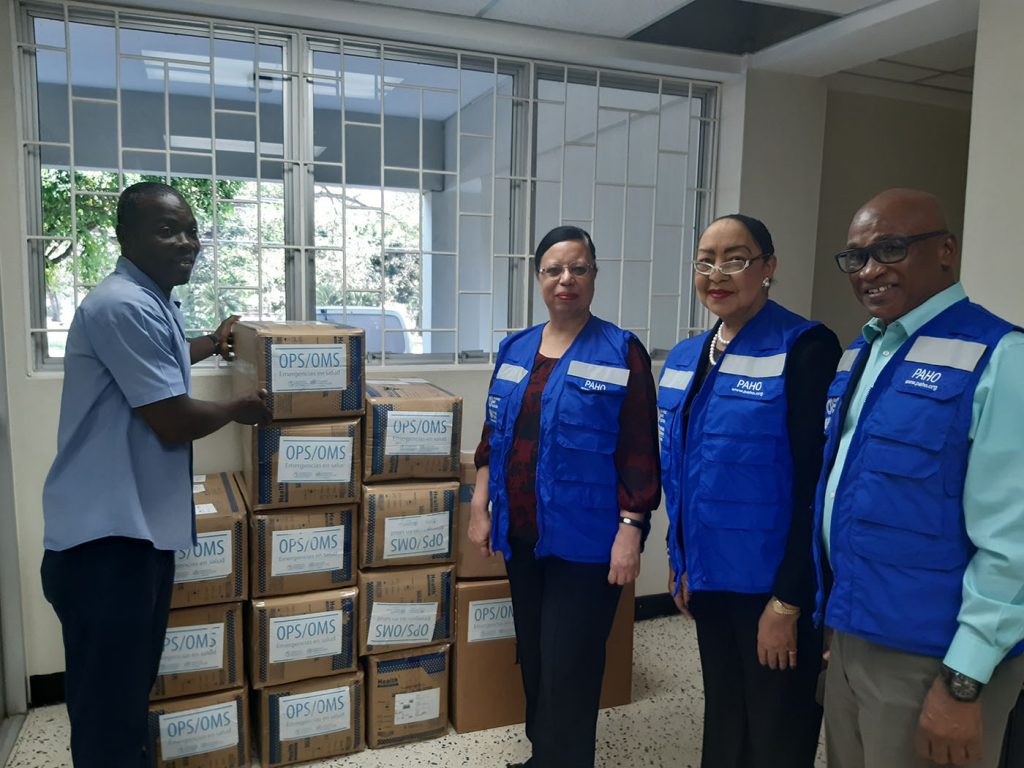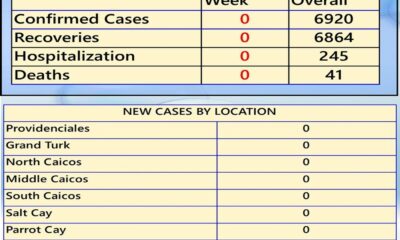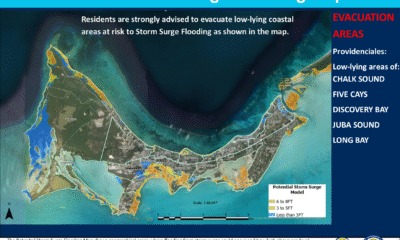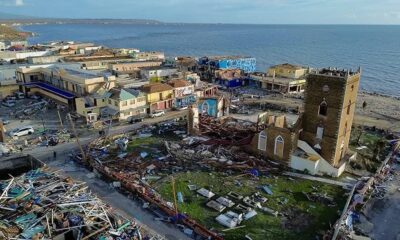Caribbean News
Jamaica among countries to receive more test kits from PAHO
Published
6 years agoon

KINGSTON, April 22 (JIS): Jamaica is expected to be among the regional countries to receive coronavirus (COVID-19) test kits from the latest batch being provided by the Pan American Health Organization (PAHO).
Director of PAHO, Dr. Carissa Etienne, said 4.5 million additional Polymerase Chain Reaction (PCR) test kits are being dispatched to member states across North, Central and South America, and the Caribbean.
“This week, we are dispatching 1.5 million more test kits throughout the region followed by another three million next week, to strengthen [the] laboratory surveillance networks in our member states,” she outlined.

These will be in addition to more than 500,000 already supplied to some 34 countries, the Director indicated during a digital media briefing on Tuesday (April 21).
PAHO indicated that between February 13 and April 15, Jamaica was provided with approximately 19,000 PCR reactions (primers and probes) along with additional material necessary for detecting COVID-19 in samples tested.
The organisation has also provided COVID-19 test training for personnel at the National Influenza Centre, situated at the University of the West Indies (UWI), Mona Campus, and the National Public Health Laboratory.
The PCR technique is used to amplify trace amounts of DNA located in or on almost any fluid or surface where such may be deposited.
The amplified segments are then compared with those from known sources for verification of the specific pathogen for which testing is being conducted.
Dr. Etienne said PAHO’s provisions form part of efforts to assist member countries and territories, totalling about 52, in accelerating and expanding COVID-19 testing, based on the rapid extent to which the disease has spread regionally and globally.

She informed that as at April 20, the total number of confirmed cases across the region totalled 893,120, of which 42,686 persons have died.
She informed that as at April 20, the total number of confirmed cases across the region totalled 893,120, of which 42,686 persons have died.
The Ministry of Health and Wellness reports that Jamaica’s confirmed cases rose to 233, as at April 21, of which six persons have died, with 27 recovering.
Dr. Etienne argued that as the pandemic continues to impact the region, “it is vital for all countries to actively embrace preventative measures, while preparing for more cases, hospitalisations, and even deaths”.
“We need a clearer view of where the virus is circulating and how many people have been infected, in order to guide our actions. It is important to accelerate and expand testing to track the spread of COVID-19 in the Americas,” the Director further stressed.
Dr. Etienne said expanded and decentralised testing will enable regional stakeholders to better monitor the pandemic’s trends within each country.
“Expanded testing will also allow local health authorities to implement and strengthen contact tracing, to quickly isolate suspected cases and break the chain of transmission in communities. When combined with other basic public health measures, testing can be a powerful tool to manage the pandemic and save lives,” the PAHO Director pointed out.
She cited the Republic of Korea (South Korea) and Germany where this approach has been successful, and encouraged PAHO member states to “follow their example and expand their existing testing capacities”.
Dr. Etienne said prior to the COVID-19 pandemic declaration, many regional countries were prepared to test and detect cases of the virus.

She pointed out that by the end of February, PAHO had distributed reagents that were required for PCR testing and provided training for the appropriate use to more than 30 member states.
The Director emphasised that PCR testing remains “the gold standard for diagnosing cases and isolating them”, adding that the application is affordable and highly accurate when performed by well-trained personnel in public health laboratories.
Dr. Etienne said while PAHO continues to provide critical material to maintain this core detection capacity within the region’s public health laboratory network, several countries have found it “increasingly difficult” to sustain this undertaking as the number of cases has increased.
“We fully recognise that ramping up testing capacity for COVID-19 is a challenge for many countries in our region, which limits effective public health measures and the timely access to healthcare. This is partly due to the uneven capacity of health systems to quickly process a large volume of tests,” she indicated.

Another challenge, Dr. Etienne noted, relates to manufacturers who, she said, “are not providing enough tests as quickly as we need”.
“Even sophisticated companies in our region have been forced to exponentially scale up their supply chains, output capacity, and distribution, in just a couple of months. That level of scale-up is unprecedented. However, we are seeing encouraging signs that the market is starting to catch up,” she said.
Equally important, the Director added, is the need to ensure that these emerging tests are reliable and efficacious.
“The landscape is changing fast and PAHO will continue to help quickly evaluate new tests as they become available. PAHO is providing guidance; therefore, that will support national regulatory authorities and Ministries of Health in making sound decisions. Our platforms and expert teams are available to all member states as a resource to guide and support you,” she added.
Dr. Etienne also underscored the need for equitable access by all member states to the test kits, and encourages manufacturers to work closely with PAHO to ensure this.
She lamented that each death from COVID-19, “represents a life cut short, a family in mourning, and wasted potential for the people of the Americas”.
Against this background, Dr. Etienne said PAHO “sincerely hopes that the measures that have been implemented in many member states, thus far, are sufficient in flattening the curve significantly”.
JIS News by DOUGLAS McINTOSH
Magnetic Media is a Telly Award winning multi-media company specializing in creating compelling and socially uplifting TV and Radio broadcast programming as a means for advertising and public relations exposure for its clients.

You may like
-


Startling News: Turks and Caicos Records July COVID-19 Death as Regular Tracking Resumes & global cases up 11%
-


TCI Ministry of Health Monitoring SARS-CoV-2 Variant NB.1.8.1 and Reminds Public of Preventive Measures
-


TCI Health Officials on Alert as COVID Variant Emerges and Cases Rise in Key Travel Destinations
-


New COVID-19 Variant NB.1.8.1 Spreads Globally, Monitored by WHO
-


Jamaica Better Equipped To Deal With Another Crisis Such As Covid-19 Pandemic -PM
-


Ratcliffe: Biden Administration had the Information, Coronavirus Pandemic likely a Lab Leak
Caribbean News
Seven Days. Seven Nations. One Storm — Hurricane Melissa
Published
4 days agoon
November 1, 2025
A week of wind, water, and heartbreak
From Haiti’s hillsides to Bermuda’s reefs, seven Caribbean nations have been battered, bruised, and forever marked by Hurricane Melissa — a storm that tested not only the region’s infrastructure but its unshakable spirit of unity.
Saturday–Sunday, October 25–26 – The First Strike: Hispaniola
Before the storm even earned its name, torrential rain and flash floods swept across Haiti and the Dominican Republic, claiming lives and tearing through rural communities.
tearing through rural communities.
In southern Haiti, rivers burst their banks, swallowing roads and homes; 23 people were confirmed dead by Sunday evening. Across the border, one death was reported in the Dominican Republic as swollen rivers cut off villages in Barahona and Pedernales.
By nightfall, the tropical system had strengthened — and the Caribbean knew it was facing something historic.
Monday, October 27 – Evacuations and Airlifts
In The Bahamas, Prime Minister Philip Davis issued a mandatory evacuation for the MICAL Islands — Mayaguana, Inagua, Crooked Island, Acklins, Long Cay, and Ragged Island.
Bahamasair added extra flights as the nation braced for what forecasters warned could become the strongest storm in nearly two decades.
Meanwhile, Jamaica, Turks & Caicos, and Cuba activated their national emergency operations centers.
Tuesday, October 28 – Jamaica and Haiti Hit Hard
By afternoon, Hurricane Melissa made landfall near St Elizabeth, Jamaica, as a Category 5 hurricane — winds of 185 mph, central pressure 892 mb, the lowest ever recorded so close to the island.
Roads collapsed, bridges washed away, and Black River Hospital lost its roof. Power failed for 72 percent of the island.
BOJ TV footage shows split asphalt, sparking lines, and flooded communities abandoned for safety.
Initially four were reported dead, that grew to seven deaths and heavy damage in 170 communities; Andrew Holness, Jamaican Prime Minister calling it “a national test of resilience.”
Haiti, still recovering from the weekend’s flooding, was hit again as outer bands dumped more rain on Les Cayes and Jacmel, deepening the humanitarian crisis.
Wednesday, October 29 – Crossing to Cuba
Weakened slightly to Category 4 (145 mph), Melissa tracked north-northeast at 8 mph, hammering eastern Cuba with hurricane-force winds
and mudslides. Over 15 000 people were evacuated from Santiago de Cuba and Holguín.
In Turks & Caicos, the Regiment deployed to Grand Turk, Salt Cay, South, North and Middle Caicos, preparing shelters and securing public buildings.
Thursday, October 30 – The Bahamas and the All Clear
Melissa’s speed increased, sparing the northern Caribbean its worst.
The Bahamas Airport Authority closed 13 airports from Mayaguana to Exuma International; none reported casualties, though infrastructure suffered.
In Turks & Caicos, the all-clear came early Thursday after minimal impact. Premier Washington Misick expressed gratitude and pledged support for neighbors:
“We must act — not only with words, but with compassion and deeds.”
Friday, October 31 – Counting the Cost
By Friday, Melissa had weakened to Category 3 (120 mph) north of Cuba.
The Bahamas Department of Meteorology issued its final alert, lifting warnings for the southern islands.
Regional toll:
- Haiti: 23 dead, thousands displaced.
- Jamaica: 7 dead, 170 communities damaged; 72% without electricity
- Cuba: 2 dead, 15, 000 evacuated.
- Dominican Republic: 1 dead, flooding in southwest.
- Bahamas: 0 dead, minor infrastructure damage and flooding in southeast.
- Turks & Caicos: minimal to no impact.
Relief and Reconnection
The Cayman Islands became the first government to touch down in Jamaica post-storm. Premier Juliana O’Connor-Connolly led a contingent bringing a plane-load of essentials and pledged US $1.2 million in aid.
Reggae icon Shaggy arrived on a private jet with friends, delivering food, medical kits, and hygiene supplies.
Meanwhile, Starlink and FLOW Jamaica activated emergency satellite internet across Jamaica providing free connectivity through November.
From overseas, U.S. President Donald Trump, speaking during his Asia tour, announced that American search-and-rescue teams and disaster aid will support the region.
“They can depend on U.S. assistance as they recover from this historic storm,” he said.
Faith, Funds, and False Websites
The Government of Jamaica and the Sandals Foundation have both launched verified donation portals for recovery. Officials are warning against fake crowdfunding pages posing as relief sites and urging donors to use only official channels.
A Seventh Nation in the Crosshairs – Bermuda
As Hurricane Melissa left the Caribbean basin, Bermuda found itself next in line.
Forecasts indicated the storm would pass just west of the island late Thursday into Friday, likely as a Category 1 to 2 hurricane with sustained winds near 105 mph.
Though far weaker than when it ravaged Jamaica, officials issued a hurricane warning, urging residents to secure property and expect tropical-storm conditions.
By all appearances Bermuda is heeding the warnings
The Human Response
Across the Caribbean, solidarity surged.
The Global Empowerment Mission (GEM) in Miami began airlifting relief supplies, while churches, civic groups, and businesses in The Bahamas and Turks & Caicos organized drives for displaced families.
“Your dedication gave our islands the strength to face the storm,” Premier Misick said. “Together, as one Caribbean family, we will rise stronger.”
Resilience in the Wake
Melissa’s winds may have faded, but her impact endures. Engineers are inspecting bridges, hillsides, and water systems; volunteers are clearing debris and distributing aid in communities still cut off.
From Haiti’s ravaged river valleys to Jamaica’s sugar towns, from Cuba’s eastern hills to The Bahamas’ salt ponds and Bermuda’s reefs, the region once again stands at the crossroads of ruin and renewal — and leans, as always, toward hope and a faithful God
Caribbean News
Haitian Pushback Halts Controversial Constitution Rewrite — What’s Next?
Published
3 weeks agoon
October 15, 2025
Deandrea Hamilton | Editor
Haitian media, legal scholars and civic voices did what bullets and barricades couldn’t: they stopped a sweeping constitutional overhaul widely branded as anti-democratic. Editorials and analyses tore into proposals to abolish the Senate, scrap the prime minister, shift to one-round presidential elections, expand presidential power, and open high office to dual-nationals—a package critics said would hard-wire dominance into the executive at a moment of near-lawless insecurity.
The Venice Commission—Europe’s top constitutional advisory body—didn’t mince words either. In a formal opinion requested by Haiti’s provisional electoral authorities, it pressed for clear legal safeguards and credible conditions before any referendum, including measures to prevent gang interference in the electoral process—an implicit rebuke of pushing a foundational rewrite amid a security collapse.
Facing that drumbeat, Haiti’s Transitional Presidential Council has now formally ended the constitutional-reform initiative. The decision, taken at a Council of Ministers meeting at the National Palace, effectively aborts the rewrite track that has haunted Haiti since the Moïse and Henry eras.
So what now? Per the Miami Herald, the pivot is back to basics: security first, elections next. That means stabilizing Port-au-Prince enough to run a vote, rebuilding the electoral timetable, and empowering the provisional electoral machinery—none of which is simple when gangs control vast chunks of the capital and state authority remains fragile. Recent headlines underline the risk: gunfire has disrupted top-level government meetings, a visceral reminder that constitutional theory means little without territorial control.
Bottom line: Haitian journalists and public intellectuals helped slam the brakes on a high-stakes centralization of power that lacked legitimacy and safe conditions. International constitutional experts added weight, and the transition authorities finally conceded reality. Now the fight shifts to making an election possible—clean rolls, secure polling, and credible oversight—under circumstances that are still hostile to democracy. If the state can’t guarantee basic safety, any ballot is theater. If it can, shelving the rewrite may prove the first real step back toward consent of the governed.
Caribbean News
Political Theatre? Caribbean Parliamentarians Walk Out on House Speaker
Published
3 weeks agoon
October 14, 2025
By Deandrea Hamilton | Magnetic Media
October 14, 2025 – It’s being called political theatre — but for citizens, constitutional watchdogs, and democracy advocates across the Caribbean, it feels far more serious. Within a single week, two national parliaments — in Trinidad and Tobago and St. Kitts and Nevis — descended into turmoil as opposition members stormed out in protest, accusing their Speakers of bias, overreach, and abuse of parliamentary procedure.
For observers, the walkouts signal a deeper problem: erosion of trust in the very institutions meant to safeguard democracy. When Speakers are viewed as political enforcers instead of neutral referees, parliaments stop functioning as chambers of debate and start performing as stages for power and spectacle — with citizens left wondering who, if anyone, is still accountable.
October 6: St. Kitts Parliament Erupts
The first walkout erupted in Basseterre on October 6, 2025, when Dr. Timothy Harris, former Prime Minister and now Opposition Leader, led his team out of the St. Kitts and Nevis National Assembly in a protest that stunned the chamber.
led his team out of the St. Kitts and Nevis National Assembly in a protest that stunned the chamber.
The flashpoint came as the Speaker moved to approve more than three years’ worth of unratified parliamentary minutes in one sitting — covering 27 meetings and three national budgets — without individual review or debate.
Dr. Harris called the move “a flagrant breach of the Constitution and parliamentary tradition,” warning that the practice undermines transparency and accountability. “No serious parliament can go years without approving a single set of minutes,” he said after exiting the chamber.
The Speaker defended the decision as administrative housekeeping, but critics were unconvinced, branding the move a “world record disgrace.” The opposition’s walkout triggered renewed calls for the Speaker’s resignation and sparked a wider public discussion about record-keeping, accountability, and respect for parliamentary norms in St. Kitts and Nevis.
October 10: Trinidad Opposition Follows Suit
Four days later, on October 10, 2025, the Opposition United National Congress (UNC) in Trinidad and Tobago staged its own walkout from the House of Representatives in Port of Spain.
The UNC accused the Speaker of partisan bias, claiming she had repeatedly blocked urgent questions, ignored points of order, and allowed government members to breach standing orders without consequence.
“The Speaker has failed in her duty to act impartially,” the Opposition declared in a statement. “Parliament is not the property of any political party or Presiding Officer.”
The dramatic exit was seen as a culmination of months of rising tension and frustration, with opposition MPs arguing that parliamentary rules were being selectively applied to silence dissenting voices.
Political analyst Dr. Marcia Ferdinand described the twin walkouts as “a warning sign that parliamentary democracy in the Caribbean is teetering on the edge of performative politics.”
“When chairs become political shields rather than constitutional referees,” she said, “democracy becomes theatre, not governance.”
A Pattern Emerging
While St. Kitts and Trinidad are very different political environments, both incidents point to the same regional fault line: the perception that Speakers — the guardians of parliamentary order — are no longer impartial.
In Westminster-style systems like those across the Caribbean, the Speaker’s authority depends not on power but on public confidence in fairness. Once that credibility erodes, parliamentary control collapses into confrontation.
Governance experts say the implications are serious: eroded trust between government and opposition, declining public confidence in state institutions, and growing voter cynicism that “rules” are flexible tools of political advantage.
Why It Matters
Parliamentary walkouts are not new in the Caribbean, but what makes these recent events different is their frequency and intensity — and the regional echo they’ve created. Social media has amplified images of lawmakers storming out, with citizens from Barbados to Belize questioning whether the same erosion of decorum could be happening in their own legislatures.
the regional echo they’ve created. Social media has amplified images of lawmakers storming out, with citizens from Barbados to Belize questioning whether the same erosion of decorum could be happening in their own legislatures.
Analysts warn that if this perception takes hold, it risks diminishing the moral authority of parliamentary democracy itself.
“Once opposition MPs believe the rules are rigged, and once citizens believe Parliament is just performance,” said one Caribbean governance researcher, “you’ve lost the most valuable currency in democracy — trust.”
Restoring Balance
Political reformers across the region are calling for tighter Standing Order enforcement, independent parliamentary service commissions, and training to strengthen Speaker neutrality. Civil society leaders say the public must also play its part by demanding transparency and refusing to normalize partisan manipulation of parliamentary procedure.
Whether these twin walkouts become catalysts for reform — or simply another episode of Caribbean political theatre — will depend on what happens next inside those chambers.
For now, democracy watchers agree on one thing: when opposition leaders feel the only way to be heard is to walk out, the entire democratic house — not just its Speaker — is in danger of collapse.
Angle by Deandrea Hamilton. Built with ChatGPT (AI). Magnetic Media — CAPTURING LIFE.









